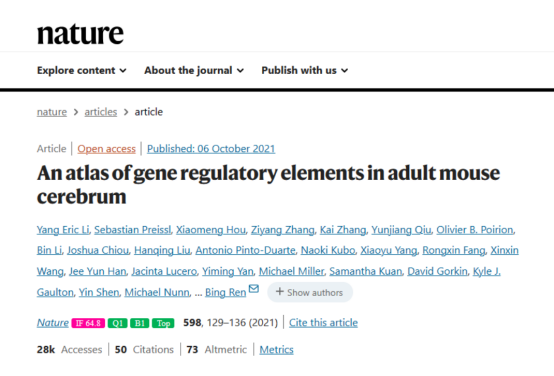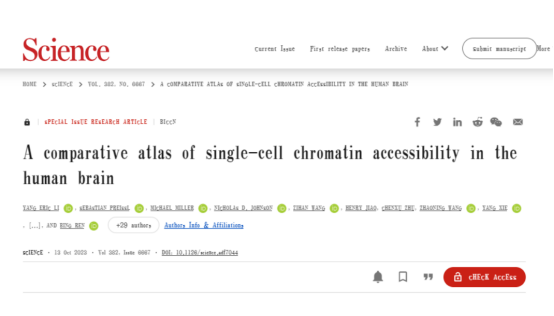Please click the button below to go to our email login page
|
As a post-90s and an independent principal investigator, he publishes the first Science paper, opening a new era of brain science!In 2019, the World Health Organization (WHO) has reported that one in eight people globally may suffer from neuropsychiatric disorders, and even worse, the incidence of these diseases shows an upward trend. There is a member of Yang Li’s family succumbing to these diseases, which is one of the reasons for his engagement in the brain science research. In 2018, Yang Li was a postdoctoral fellow in Dr. Bing Ren’s laboratory, at UC San Diego, and meanwhile, joined a program in the NIH’s “Brain Research through Advancing Innovative Neurotechnologies (BRAIN) Initiative (abbreviated as “Brain Initiative”)”, through which he initiated a research journey on brain.
A Nature paper + a Science paper The “Brain Initiative” is attempted to obtain an in-depth understanding on the brain of mammalian and human through developing innovative neurotechnologies and research methods. However, due to sophisticated and complex structure of brain, this initiative can be divided into two stages. In the first stage, the main efforts were made to develop single-cell sequencing technology, construct computing framework and conduct test and verification in mouse brain, so as to comprehensively describe various types of neurocytes. Ultimately, Yang Li, as the first author, finished relevant research in 2021 and published his first Nature paper.
The core of the second stage is the feasibility verification of these experimental technologies and computing framework in human brain. Yang Li and his research team has analyzed and determined 107 subtypes of cerebral cells, linked them to 19 kinds of mental diseases including Schizophrenia and Alzheimer’s disease, mapped human cerebral single cell epigenetic map, and finally published the research achievements on Science.
In addition, they have established a deep learning model to predict how changes in some DNA sequences impact gene regulation and induce diseases. The obtained achievements have been published in Science and other 20 “Brain Initiative”-related papers have been published in Science and its sub-journal. We can credibly describe it as the most comprehensive map of human cerebral cells to date that can contribute to understanding how the brain develops, ages and is affected by disease, which is a beginning signal of a new era in brain science. Passion makes people forget the long passage of time Unexpectedly, brain science research is not the initial direction of Yang Li. In 2013, he was studying for his doctorate in Tsinghua University, and rapidly obtained the basic knowledge of bioinformatics under the supervision of Prof. Zhi John Lu. After obtaining the PhD Degree, Yang Li joined Dr. Bing Ren’s laboratory, at UC San Diego and later enrolled in the “Brain Initiative”. In Yang Li’s memory, when he joined the “Brain Initiative” research program, to avoid delaying the publication progress of other similar programs, sometimes he can burn the midnight oil until 4:00 or 5:00 in the morning without the feeling of tiredness. In the review stage, reviewers proposed over 40 questions, and he answered one by one patiently. “I’m truly interested in these researches. Passion makes me forget tiredness. Interest is a necessary prerequisite for scientific research, otherwise you may feel painful”, said Yang Li. Nowadays, through serious screening, Yang Li became an Assistant Professor in the Department of Neurosurgery & Genetics at Washington University in St. Louis (WUSTL). After joining WUSTL, he established his own lab, which now has 3 members. He often discusses scientific issues with these young people, hoping to grow and progress together with them and make more outstanding scientific research achievements. |



